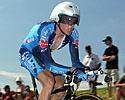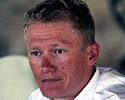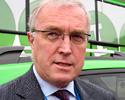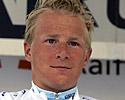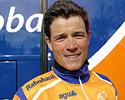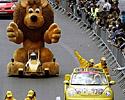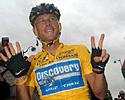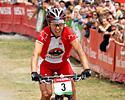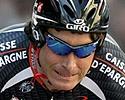First Edition Cycling News for July 1, 2007Edited by Sue George with assistance from Bjorn Haake Jaksche admits taking banned substances & blood doping
German rider Jörg Jaksche confessed Saturday to using banned substances and practicing blood doping to enhance his performance in an exclusive interview with Der Spiegel. His lawyer had said Friday Jaksche would tell all on Monday. Jaksche's doping program began in 1997 while competing for Team Polti at the Tour de Suisse. That's where he first tried EPO. He said Gianluigi Stanga introduced him to it and wanted to see to what substances Jaksche would respond. "That was my crash course. A team assistant injected me with EPO in my room," Jaksche said to Der Spiegel. Stanga, now with Milram, called Jaksche's accusations "absurd" on German channel ZDF. "Yes, I did dope, but I never overdid it," continued Jaksche to Der Spiegel. "I never took artificial hemoglobin or stuff like that, where you can get an allergic shock. And you calm yourself by saying that a guy who does bodybuilding takes 16,000 units of growth hormone a day, and I only took 800 units once in a while for regeneration. Then you think: Well, it's not that much after all." The German has competed for Team Telekom (1999-2000); ONCE-Eroski (2001 - 2003); Team CSC (2004), Liberty Seguros (2005-2006), and Tinkoff (2007). In May, Jaksche was suspended from racing by Tinkoff, which he had joined just one month earlier. Jaksche's good performances while on Polti landed him a contract with Team Telekom. He explained, "[Former Team Telekom manager Walter] Godefroot knew everything. It was a well-established system. Godefroot didn't want to prevent doping, but he wanted to prevent inept doping." Afraid of more drug raids after the 1998 Festina team's doping scandal, Jaksche said he took nothing before the 1999 Tour, in which he finished 80th. Without drugs, "You have to put in more effort, recovery is slower. I couldn't hang on and felt unnecessary. At the end, I was afraid of getting dropped at railroad bridges." Not doping almost cost him his job at Telekom. "I didn't understand the system. I didn't send my girlfriend to France with the substances," said Jaksche to Spiegel. But a few years later, he was one of 13 racers prohibited from starting the 2006 Tour de France due to an alleged connection with Operación Puerto. Spanish police had found bags of blood, illegal doping products, and names of cyclists in a raid of Eufemiano Fuentes' facilities in May of 2006. Jaksche admitted to starting a program of blood doping under the guidance of Spanish doctor Fuentes beginning in 2005. The blood bags with the name "Bella" on them, found in Fuentes' lab, were indeed his. "Fuentes was a master of disguise. None of his clients knew about the others. Not even in our team did we know if other teammates were involved or not," said the 2004 Paris - Nice winner to Der Spiegel. Commenting on the pervasiveness of doping in cycling, he added, "It's perverse, but the doping system is just, because everyone dopes. Cycling without doping is only just when really no one is doping any longer." Jaksche revealed doping was often coordinated by team management or at the very least, permitted. "The logic is you adjust your performance level to the rest, because everyone is doing it. In cycling, you live in a parallel world. "Cycling per se is not fun. It always hurts. The sport is a lot about pain, physical pain. Workouts are the attempt to increase your performance so you won't get dropped. And so it won't hurt so much first there was cortisone, then EPO and today it is fresh blood. Cycling is a difficult sport. A soccer player can run 90 minutes like a fool over the field, but if he scores the decisive goal in overtime he's the hero. In cycling, you get dropped in 99 out of 100 races, even when you give it everything. It hurts, all the time; but you still are successful only a few times." Cynical about the future, he said, "Of course, no one held my arm for the injection, but team leaders, who got rich off you in the past, who supplied the things, they are now pretending to push for a clean sport... . Nobody liked doping; neither a Stanga nor a Riis... . I was told by one rider that there are deals between some teams and the UCI concerning the training controls. So one has to assume that there is no general change going on. This rider told me that proudly. Then I knew: Nothing has changed." The UCI is now reviewing a 6,000 page dossier with additional information on Operación Puerto. According to the Associated Press, the first 1,000 pages are now under review with the remaining 5,000 to come in a few weeks. Jaksche's revelations come soon after the German Cycling Federation announced Thursday it would prohibit the racer from contesting the German national championships. Vinokourov gave one of the earliest reactions to Jaksche's revelations. "Jaksche was contacted by Der Spiegel and offered lots of money," he said to L'Equipe. "It's easy to give evidence when there is a big check in front of you. You always find a good story to justify the sum."
Cyclingnews' recent coverage of 'Operación Puerto' May 18, 2009 - Valverde to start Catalunya Cyclingnews' complete coverage of Operación Puerto Vino tells of Ferrari link
Astana Team leader and Tour de France overall favorite Alexandre Vinokourov revealed to L'Equipe Saturday that he collaborated with Doctor Michele Ferrari, but only about his physical preparation. Ferrari, was convicted in 2004 for sporting fraud and abuse of his position before the conviction was overturned in the spring of 2006. The Kazakh rider explained that he began collaboration with Ferrari after he left T-Mobile at the end of 2005. "No one directed me toward Ferrari. I was encouraged only by people like Mario Cipollini who said nothing but good things. (Lance) Armstrong also worked with him. I would not miss out on this experience," said Vinokourov. "I did a test of effort in order to see where I was physically, and my training depended on the results. Ferrari never gave me any medicines." For all medical needs, Vino said he worked with his team physicians per the rules of the UCI. Vinokourov said Ferrari's methods helped him. "His training plans were pointed and powerful. It is strange, but I sometimes had the impression that his methods worked like those I knew from my time in the USSR." Under intense scrutiny lately, two Astana riders, Matthias Kessler and Eddy Mazzoleni, were implicated in different doping affairs. Italian Mazzoleni is suspended due to his involvement with Oil for Drugs while CONI investigates. German Matthias Kessler was also recently suspended for a positive testosterone doping test result of his A sample. B sample results are pending. McQuaid calls for fewer certificates permitting banned substances
UCI President Pat McQuaid asked for tighter regulations to close loopholes in current anti-doping policies. He highlighted the widespread permitted use of banned substances under the UCI's program which provides Therapeutic Use Exemption (TUE) certificates for many riders. "There are too many (certificates), the moment has come to study new and more rigorous rules," said McQuaid to Gazzetta dello Sport Saturday. "There are riders who truly have need to use these substances but we realize also that the system has been coerced for the profit of some riders." In an effort to address anti-doping concerns, McQuaid recently asked all Tour de France riders to sign the UCI's new charter against doping. "Our sport is in danger because of doping," he said. "I cannot accept that doping practices are tolerated. I call this 'zero tolerance.'" As previously reported, at last year's Tour de France, there were 13 positive tests for performance-enhancing substances 13 times, but in 12 of those cases, there were 'therapeutic use exemptions' (TUE). All the cyclists concerned were thus able to prove that they needed the substances to treat illnesses, except one: Floyd Landis, who could not produce a TUE for his high testosterone:epitestosterone ratio. In fact, 60 of the 105 total riders subjected to doping controls during the Tour had TUEs which allowed them to use prohibited substances in competition. McQuaid's comments come only days before Milram's star sprinter Alessandro Petacchi will appear in front of Italian Olympic Committee (CONI) at an anti-doping hearing, scheduled for Monday. His 'non-negative' result came from the 2007 Giro d'Italia. The sprinter took his third of five Giro stage wins in Pinerolo on a rain-soaked day (May 23) ahead of a massive crash but afterwards his post-race control revealed high levels of Salbutamol (asthma drug) in his urine. Petacchi had 1320 nanograms of Salbutamol in his sample. WADA allows 1000 ng/ml. The rider has raced for years with TUEs for Salbutamol treating his asthma. His case is similar to that of Igor González de Galdeano, who in the 2002 Tour de France registered a reading of 1360. The UCI did not count this as a 'positive' and it allowed the Spaniard to continue racing. Petacchi hopes to start in the Tour de France on July 7. In the meantime, at least until a verdict comes out of Monday's hearing, Petacchi's team Milram has suspended him pending a resolution of the case. Wegmann counts down the days
Fabian Wegmann (Gerolsteiner) is counting the days until the start of the 2007 Tour de France. On his website, www.fabianwegmann.com, he writes that it would be "great if someone from our team could wear the German championships jersey during the Tour." While he thinks the team has a chance, he also points out that last year's race showed what can happen at the end. Wegmann has prepared for the national title race and the Tour by spending a few days training at the Berninapass (near St. Moritz) with fellow teammates Markus Fothen and Heinrich Haussler. The threesome stayed in a Hotel near the top. Wegmann wrote that his form is good and that only a good result is missing. He hopes to be better than last year because then "I would be on the podium." After the race on Sunday the Gerolsteiner rider will spend a brief moment in his hometown of Münster before heading back to his adopted home in Freiburg. After the last training session on Tuesday he'll be flying to London on Wednesday. Wegmann is a bit nervous before the start, but hopes that the nervousness will translate into a successful Tour. Like last year the German will publish a diary [in German] from the Tour, which will appear on his website as well as the regional daily paper Badische Zeitung. Niermann ready to help
Grischa Niermann is ready to help his Rabobank teammates in the upcoming Tour de France. In an interview with radsport-aktiv, the German said that after his injury-plagued spring, he is getting in form and his preparation with the Volta a Catalunya, the Dauphiné Libéré and some altitude training in Livigno/Italy has gotten him ready to tackle the three-week race in France His own ambitions have to stay behind, but for him, "being part of the Tour team with people like Rasmussen, Menchov, Freire and Dekker is a tremendous success." He'll put himself to the team's service for contesting the White jersey with Thomas Dekker, the Green jersey for Oscar Freire, the Polka Dot (Michael Rasmussen) and the Yellow jersey (Denis Menchov). "But if in the end, we only get one out of the four it still will be a success." His favourites are quite many. Not surprisingly he names teammate Menchov, along with the Astana trio of Alexander Vinokourov, Andrey Kashechkin and Andreas Klöden. But he also gives chances to American Levi Leipheimer and Spaniards Carlos Sastre and Alejandro Valverde. His big hope is for a scandal-free Tour de France that's full of suspense. Tales from the peloton: Caravan gone wrongBy Les Woodland
We all have the dream: to ride the route of the Tour just ahead of the riders. Or at any rate, just before the caravan. It's only when we see what that means, being in the middle of a whirlwind of journalists' cars, television trucks and team buses, that realisation dawns: the roads of the Tour are dangerous long before the racers arrive and it's not for nothing that the gendarmes are severe with bikies who use them. Accidents and even deaths are thankfully rare, but they are far from unknown. One of the worst, of which little is ever heard nowadays, happened on July 11, 1964. The Tour that summer was leaving the Atlantic port of Bordeaux for a finish in Brive. Ahead of it as usual was the advertising caravan, more entertaining in those days than now, and also a tanker carrying fuel for the cars and motorbikes of the Tour's police force. It was 1:15pm, relaxed lunches had just been finished and glasses of wine downed. There was a party atmosphere because the Tour was expected in another 15 minutes. A Frenchman was in yellow. Nobody knows why but the tanker driver took a bend too fast as he approached the river bridge at Port-de-Couze, in the Dordogne. Some say he was confused by the roads, that with so many people waiting to see the Tour he had mistaken the river's towpath for the road that he needed. Whatever the reason, the tanker swerved too fast to the right towards the crowded bridge despite the frantic waving of other policemen waiting to direct the race. Forty spectators were thrown into the river, some of them struck by the truck, others losing their balance, some simply jumping for their lives. To read the complete feature, click here.
Lance rides to seventh heaven
Over the next eight days, in the buildup to the world's biggest sporting event, Cyclingnews will be taking a look at the Tour de France in all its glory with a series of short movies. We start with a look back on the domination that was Lance Armstrong. We all know the story, Lance Armstrong is diagnosed with cancer, overcomes the impossible to come back from the brink of death to beat the disease, gets back on his bike and proceeds to annihilate the rest of the pro Peloton in his typical "thanks for coming" fashion to no less than seven consecutive Tours de France. We take a look back over those seven tours spanning from 1999 until 2005, when Lance retired, undefeated, on the final day of the tour. The movie remembers all of Lances Tour wins, from the first in 1999 when only in his second season post cancer; he dominated the race taking all three time trails as well as the first mountain stage to Sestričres, to beat Alex Zülle. Over the next six years the challengers changed, all taking their chances to beat the dominant Armstrong, but one by one Ullrich, Beloki, Klöden and Basso fell by the wayside as the American silenced all his critics to take 18 more stages on his way to an unprecedented seven tours. Click here to view the video.
Unibet astonished by PrudhommeUnibet.com, the Swedish-Belgian outfit that was at the centre of a controversy earlier this year, has expressed its astonishment to yesterday's statement by Tour de France head Christian Prudhomme. The Frenchman declared yesterday that Unibet couldn't be invited to the Tour because they haven't been producing results. Not surprisingly Unibet's reaction came quickly and Koen Terryn, general manager of the company, told AFP "he [Prudhomme -ed] always told us we couldn't race because it was illegal. In the ProTour ranking we are 19th. We are ahead of Milram despite only having been able to do about half the races." Terryn continued that "in a way it pleases us that the juridical reasons aren't cited as the main ones anymore." The lawyer for the team, Christoph De Preter, stated that it probably wasn't random that the UCI changed their strategy now. "Unibet has communicated the intent of legal action as they can't be seen illegal anymore," referring to the comments by the European commissioner Charlie McCreevy, who called the opinions of the Tour organizers "highly questionable". Absalon & Premont to try for Canadian World Cup winsBy Rob Jones
St-Félicien is a last minute replacement for Angelfire (New Mexico), after the organizers of the planned triple there abruptly pulled the plug last December. The area has never held a race of this magnitude before (they have held a well regarded Canada Cup race); however, Mont Sainte Anne (MSA) organizers Gestev, are assisting with the technical management of the event. For the women, it will again be a battle between World Cup leader Irina Kalentyeva (Ergon-Topeak) who won last weekend at MSA, Ren Chengyuan (China), Spitz and Canadian star Marie-Helene Premont (Rocky Mountain-Haywood). Premont will certainly be highly motivated, after a crash early in the race at MSA denied her the opportunity for a third consecutive win in front of a home crowd. Former series leader, ranked #2 in the standings, Marga Fullana (Spiuk-Tau Ceramica) will not race. The overall title is still open to the four top riders, and likely will be at least a three-way battle until the final event in Maribor (Slovenia) after the Worlds in September. On the men's side, Julien Absalon (Orbea) has the chance to take his fourth consecutive win of the series, and mathematically lock up the overall title with one race remaining. However, both Jose Hermida (Multivan Merida) and Sauser have pushed him hard in the past few races, and Absalon's victory is by no means assured. The top North American hope will be Canadian champion Geoff Kabush (Maxxis), who finished a strong third at MSA, and would certainly like to score his first ever World Cup victory on home soil. To read the complete preview, click here. Caisse D'Epargne motivated for nationals
Team Caisse d'Epargne will field riders at the start of the road national championships which will take place in Cuenca, Spain, and in Aurillac, France, Sunday morning. The Spanish riders will be extra motivated after taking first and second in their national time trial earlier this week. New national time trial champion Jose Iván Gutiérrez and silver medallist Luis León Sánchez will take part in the road race, together with David Arroyo, Imanol Erviti, Vicente García Acosta, David López, Alberto Losada, Oscar Pereiro, Aitor Pérez, Fran Pérez, Ruben Plaza, Vicente Reynes, Joaquím Rodríguez, Alejandro Valverde, Constantino Zaballa and Xabier Zandio. (All rights reserved/Copyright Knapp Communications Pty Limited 2007) |

|
January 2009 |
Recently on Cyclingnews.com |

